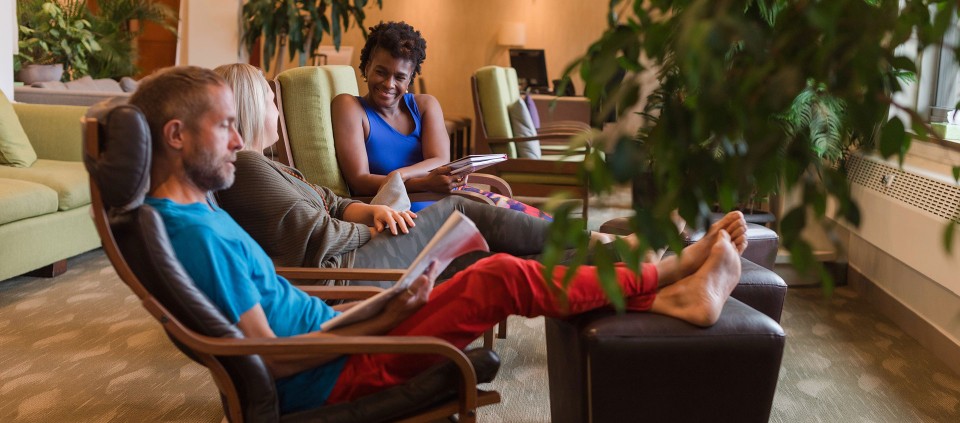Seven Tools to Help You Feel Less Stressed

Feeling stressed? You're not alone, especially if you live in the United States. More than half of Americans are stressed out on a daily basis, according to the Gallup 2019 Global Emotions Report—compared with 35 percent globally.
Here's an interesting finding, though: Among those who report high stress, 57 percent feel paralyzed by it, while the other 43 percent say that stress invigorates them.
"It’s how we perceive our stress that determines how it impacts us," says Janna Delgado, a Kripalu RISE Facilitator and Lead Faculty for the Kripalu School of Yoga. "You can't make stress go away—it's an inherent part of life. But if you can reframe it as excitement or motivation, it won't have the same detrimental effects."
The things that stress us out are usually the things that are most meaningful to us, Janna says—major achievements like having a baby or getting a PhD unavoidably bring stress, which she defines as "anything that bumps us out of our window of tolerance."
"Manageable stress helps us to thrive and grow," she says. "When stress is chronic and unmanageable, that's when it becomes a problem and starts triggering physical and mental-health issues. We want to build the capacity to rise to meet the challenges, and then create time to rest, recover, and recharge before we meet the next stressor." This capacity for resilience is key, allowing us to move fluidly between the stress response (the sympathetic nervous system) and the relaxation response (the parasympathetic nervous system).
Janna offers a toolkit of stress-resilience practices to build into your routine.
- Movement. Any technique that gets energy and oxygen flowing through the body is useful, whether it's a vigorous vinyasa practice, a simple joint-opening or stretching routine, or a leisurely 10-minute stroll around the block once a day. Exercise is proven to reduce stress through a variety of psychological and physiological mechanisms, including lowering cortisol levels and releasing endorphins. Interoception—the sense of the internal state of the body, which is enhanced by embodied movement practice, is also proven to increase resilience. Research shows that people who are less aware of their body's internal sensations have lower resiliency levels.
- Breath. “The breath is the only part of autonomic nervous system we can control, so it’s a key tool for modulating and regulating your response to stress,” says Janna. “It’s the quickest and most reliable way to bring your system into a more relaxed state.” Try Sun Breaths, Three-Part Breath, or Nadi Shodhana, which stimulate the parasympathetic nervous system.
- Mindfulness. It’s amazing how powerful the simple act of pausing can be for both our physical and emotional states of being. "The ability to stay focused on the present moment with an attitude of curiosity, compassion, and nonjudgment, supports resilience," Janna says. "Practicing mindfulness literally trains the brain to become less reactive by diminishing the sensitivity of the amygdala," the brain's fear center. That can happen via a meditation practice, mindful eating, or simply taking a few minutes to slow down and pause before moving forward with your next task or responsibility for the day.
-
Good nutrition: Eating poorly or irregularly can cause blood sugar spikes and crashes, and deprive both body and mind of the energy needed to “metabolize” stressors. “We need to replenish and refuel physically in order to avoid the cycle of stress,” Janna says.
-
Social connection: Positive social support is proven to enhance stress resilience, even mitigating the effects of genetics and environment. "Social connection is a common factor among the happiest people on the planet," says Janna.
-
Sleep and downtime. When we don’t get enough sleep, it can impair our digestion, critical thinking, and more. In yogic philosophy, the hours of sleep you get before midnight actually count double compared to the hours of sleep you get after midnight. But wakeful downtime is equally important, says Janna, so we can integrate our experiences and refill our well.
- Self-massage with oil. Consider building time into your weekly routine for the Ayurvedic practice of abhyanga—a self-massage with soothing oils, like sesame or coconut oil. The practice has a calming effect on the nervous system, and the act of self-care will leave you feeling nourished and held.
Establishing a new routine that includes some of these practices may take a little time. Start with one or two, then add more as the others become a natural part of your rhythm. To overcome resistance, focus on the three As: Awareness, Acceptance, and Adjustment. Become aware of the obstacles preventing you from your new habits; accept them without judgment or self-criticism; and adjust your routine, your expectations, your attitude—whatever helps you to move toward a less stressful life.

